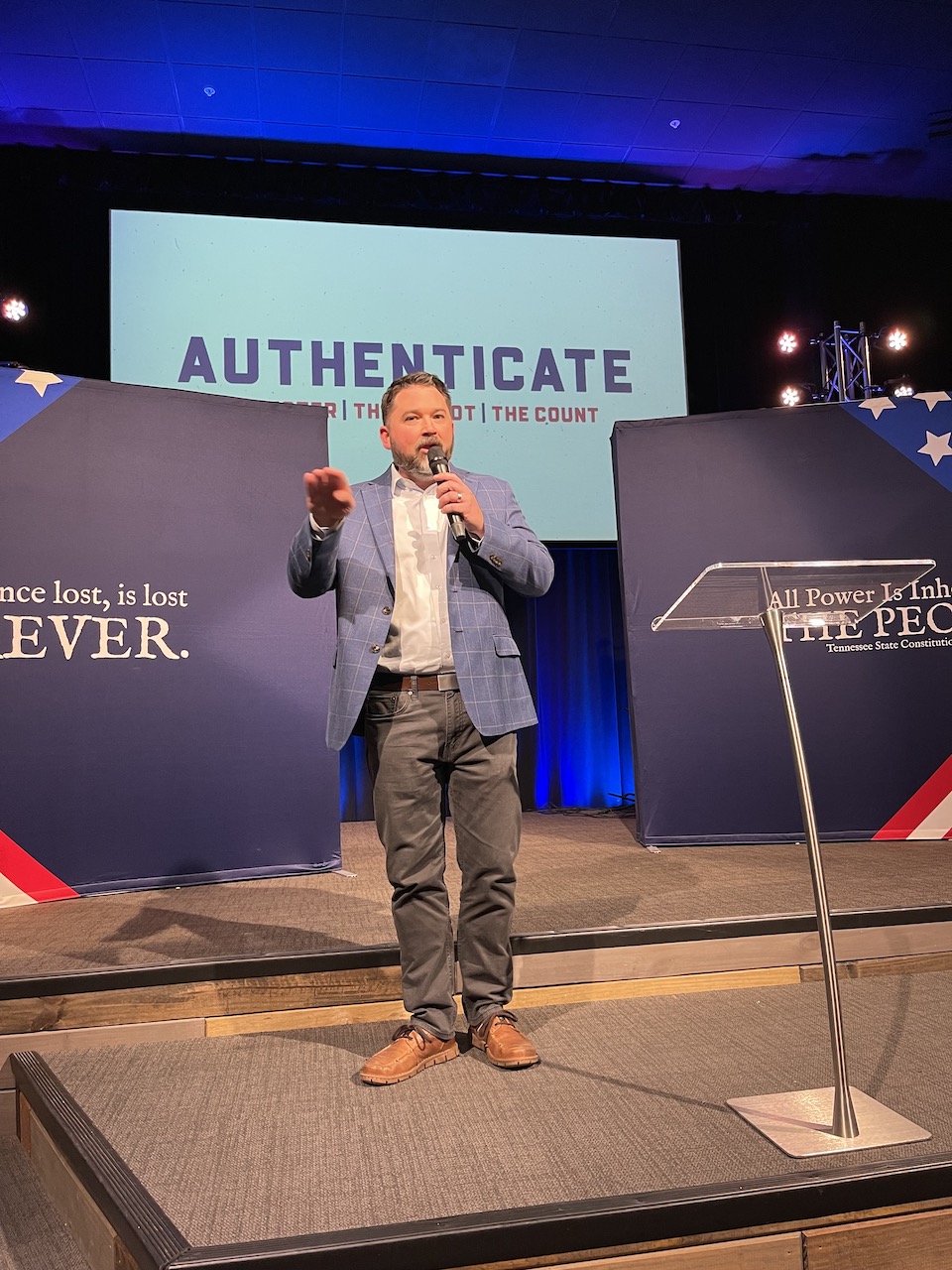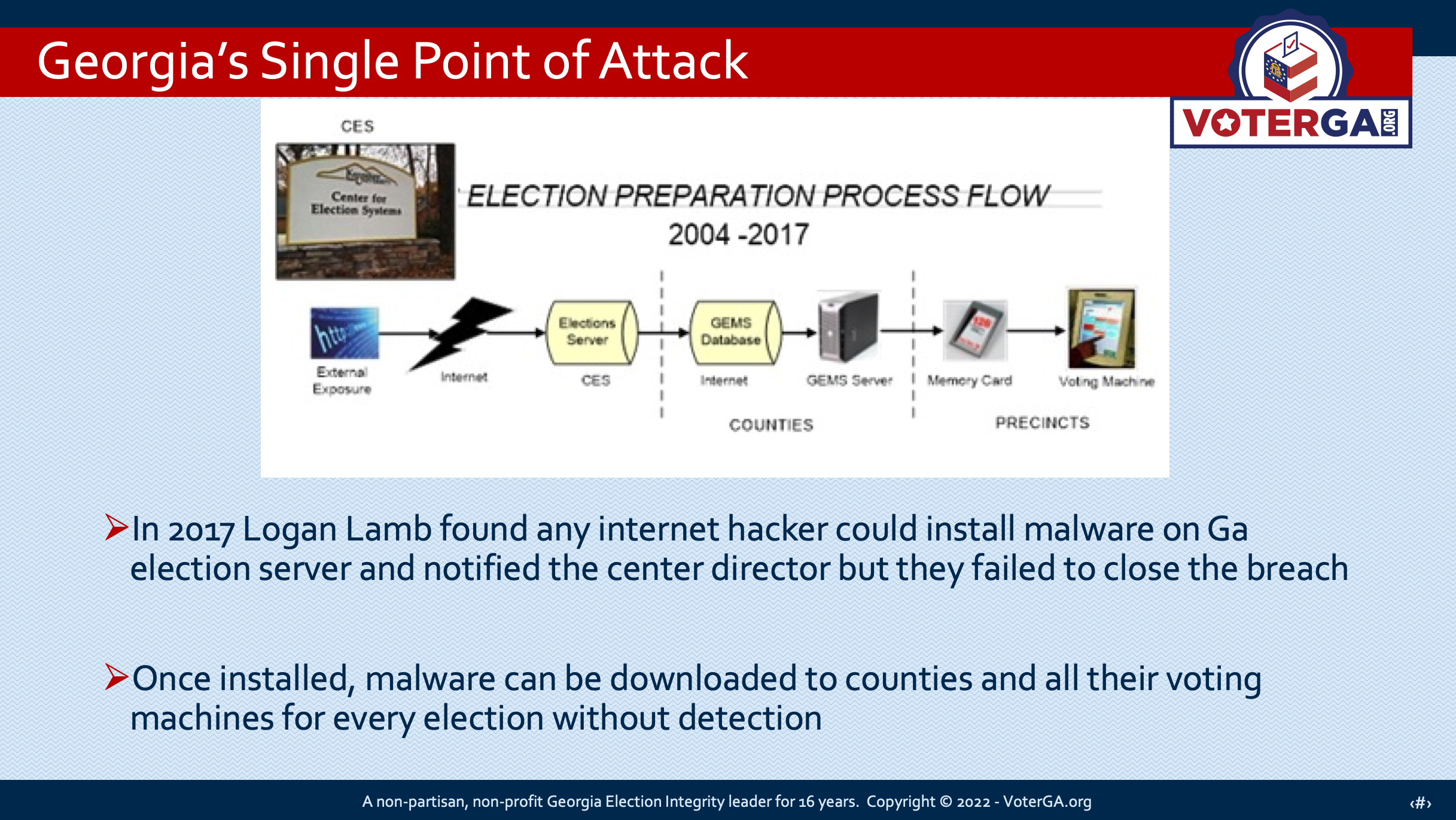Tennessee Stands took the initiative on Jan. 27, funding and producing an election integrity symposium to make the case that the state's election systems are not as secure or transparent as Tennessee election officials might have you believe. Gary Humble, the founder of Tennessee Stands, interviewed two of the three presenters, Garland Favorito and Bennie Smith, the following day. The two are long-time friends who have worked for years together on election integrity. Humble said during the podcast's introductory remarks on the podcast, that "the thrust of the event" was to challenge the belief held by so many Tennesseans and legislators that "nothing bad ever happens in Tennessee. Everything's good, everything's fixed. Trust us," he said sarcastically.
The evening had nothing to do with Party. Rather, the forum was dedicated to making elections in Tennessee as fraud-free and transparent to the voter as possible. The presentations peered into the world of election equipment and ballots.
 Gary Humble/Tennessee Stands/Jan. 27, 2022
Gary Humble/Tennessee Stands/Jan. 27, 2022
Tennessee Stands invited some superstars to speak to an audience of about 300 in Franklin, Tennessee, with many more streaming remotely online. The featured speakers were Garland Favorito, co-founder of VoterGA; Mark Finchem, Rep. for Pima County, AZ, who is currently running for secretary of state; and Bennie Smith, a software developer who was the lone Democrat in the bunch. Smith currently serves on the Shelby County Tennessee Election Commission.
Garland Favorito's Presentation on Voting Systems
Favorito, arguably one of the most knowledgeable in the country on what not to do in elections, was first to share his experiences and expertise. He is a "career Information Technology (IT) professional with over 40 years of in-depth experience and over 17 years of volunteer research into electronic voting systems. He also serves as a volunteer Elections Director for the Constitution Party of Georgia," per his bio on the VoterGA website. Favorito is legendary in Georgia in his determination to secure transparent elections for the voters there. He has been at it for years in one capacity or another, and most of his efforts have been voluntary.
 Garland Favorito/VoterGA/Jan. 27, 2022
Garland Favorito/VoterGA/Jan. 27, 2022
One of his most important initiatives has been his ongoing legal battle to "gain access to inspect and scan approximately 147,000 mail-in and absentee ballots" from the 2020 election. He is now ready to appeal Judge Amero's decision to dismiss the case in October due to standing. Amero originally approved the unsealing of the ballots in May of 2021. Favorito's case is inextricably linked to the current secretary of state, Brad Raffenberger's belated, recent agreement to investigate alleged rampant ballot harvesting using dropboxes found by True The Vote. All that to say, Favorito is no neophyte in the world of elections.
Favorito's presentation aimed to dispel the oft held viewpoint that Tennessee's red-state status is secure with few imperfections in its voting systems. His PowerPoint presentation argues that Tennessee elections may be no better than elections in Georgia. Hand-marked paper ballots are king, says Favorito. He also says the state has to better its awareness of some machines being used.
Reminding the audience that "roughly 70 percent of TN counties use paperless Direct Recording machines (DREs)," he says that the DREs almost certainly guarantee that the voters in those counties cannot cast a vote that is "verifiable, auditable, recount capable, and transparent."
He then discussed the use of BMDs (Ballot Marking Devices). These voting systems, like those sold by Dominion Voting Sytems and ES&S that use DREs and BMDs, "have no business being installed anywhere in America," he continued. Incidentally, his findings have been confirmed by others, including J. Alex Halderman, who performed an analysis of the Antrim County 2020 election. His detailed report is a scathing indictment of the vulnerability of election systems and technology.
[gallery type="slideshow" size="medium" td_select_gallery_slide="slide" td_gallery_title_input="Favorito Powerpoint" ids="36206,36227,36228"]
His next slides discuss flaws with BMDs. One of the more concerning issues is that voters "cannot verify their ballot after printing it and before scanning it." Another flaw is the QR code. It is encoded, and the information contained in it is unverifiable to the voter:
[gallery type="slideshow" size="medium" td_select_gallery_slide="slide" td_gallery_title_input="BMD's & QR Codes" ids="36229,36231,36232"]
Slide 11 in his presentation compares features of the BMDs from the various voting systems. It shows how each fares in "terms of completeness, clarity, and independence." The slide includes "all the vendors in all of the states." Most importantly, said Favorito, the voter needs a full ballot. He emphasized few of the undesirable features—focusing on the bar codes that include votes and the "all-in-one" column, which means the scanner and the BMD are in the same unit. About the all-in-one, he said, "God help us, we won't even go there tonight. That one has some real, real serious problems about the ways it can be hacked."
Favorito stated that election machines are extremely vulnerable to hacking. "Malware can be downloaded to counties and all of their machines for every election without detection," he says.
 Hacking is Possible/Favorito/VoterGA/Slide 6
Hacking is Possible/Favorito/VoterGA/Slide 6
The solutions are "cheap and secure," said Favorito, yet most counties do not employ them. He adamantly advocates for hand-marked paper ballots. The shelf life of most voting equipment, he explained, is about ten years—and yet states like Georgia financed a 20-year bond for the equipment:
Paper ballots—the cheapest and most secure. We advocated for this. We could have done this in Georgia for about 50 million. They had to spend 150 million, and then they wanted us to spend another 100 million on the unfunded mandate to the counties. Because when you have ballot marking devices—here's the other thing people don't understand in terms of cost.
So, yeah, they have twenty of these things in one precinct. Whereas you can have one scanner and one tabulator—or maybe two. And maybe if you wanted to do ballot-on-demand, you even do that one or two— not twenty! When you add all those costs up, you've got licensing, maintenance, testing, logistics—all of that stuff! That put $100 million over 10 years on the counties. It is an unfunded mandate!
Not only that—in Georgia, they financed this over twenty years, with a 20-year bond. But the system only has a 10-year shelf life. Then in Georgia, we need a fiscal note to do that [because it is] such a big expenditure. So they decided that they were going to do this without a fiscal note, and that's what they did. They passed it—the lieutenant governor who's now retiring said that we didn't need a physical note for that bill. And by the way, just so you know, these are the Republicans who did this to us."
[gallery type="slideshow" size="medium" td_select_gallery_slide="slide" ids="36236,36237"]
Favorito says that "secure, transparent elections increase voter confidence, and protect citizens against a hostile takeover of America from a rigged election."
One Person, One Vote?: Bennie Smith Talks Fractional Votes
Bennie Smith's animated presentation emphasized the hackability of machines. A software engineer that knows precisely where the vulnerabilities are and says machines can be algorithmically set to reflect fractional (weighted) voting. That does not correctly reflect the one person, one vote rule voters deserve. He carried with him his "bible," otherwise known as the Tennessee Election Laws handbook.
An election security specialist with years of experience developing software and code, Smith gained national recognition for his work on election security in 2016 before he was ever elected to be an election commissioner. In the 2020 video below, he demonstrates to a group of Senators in Tennessee how a voting system can be manipulated to reflect a set of desired results—manipulation which can go completely undetected.
Mark Finchem Presents His Watermarked, Serialized, Verifiable Ballot
 Rep. Mark Finchem with his ballot/Jan. 27, 2022
Rep. Mark Finchem with his ballot/Jan. 27, 2022
Rep. Mark Finchem graciously accepted a second invitation to speak to Tennesseans about his Ballot Integrity Project. He spoke in front of about 90 Tennesseans, sponsored by the Nashville Sentinels, on May 27 to explain how his ballot differs from what is currently being used. The Authentix ballots are serialized, watermarked, and impossible to forge. They have a number of security features that ensure the intended vote is both secure and, later, verifiable by the voter.
[gallery type="slideshow" size="medium" td_select_gallery_slide="slide" ids="25170,25171,25172"]
Finchem, a charismatic speaker, again presented his ballot. He asked the audience members to pressure their counties, Governor Lee, and the state legislators in the audience to consider putting his secure ballot on the books. "Adopt the Arizona legislative language mandating the use of this paper in your elections!" he exclaimed. He announced his 26-state tour, "covering 26 states in 26 weeks," saying, "Yes, it is aggressive, but we have a Republic to save."
Nothing To See Here, Tennessee Voters
Kathy Harms, who has been a key figure in the investigation of elections in Williamson County, coordinated many of the logistics for the event. Her team, called the Tennessee Voters for Election Integrity, investigated both the Dominion Voting Systems equipment in the county and the voter registration system and voter rolls.
Many legislators in Tennessee try to convince voters that all is well in the state because the paper is being used in elections. However, the paper they are talking about is not a hand-marked paper ballot. Rather it is a register tape. Sadly, even now, most voters are unaware or confused about the flaws in the various voting systems.
To be clear, when a voter puts his ballot through a tabulator and that vote is tabulated in the machine, an audit of that vote amounts to a balancing of the ledger—the number of ballots entered should balance with the total on the tape. However, the voter has no idea whether his vote as intended is the one that is ultimately tabulated. And, sometimes, the "ledger" doesn't even balance.
In the October 2021 Williamson County election, Harms' own county, "Williamson County Election Commission Chair Robert Brown said six voting machines experienced a software glitch, resulting in printed result paper tape that was incorrect." To this day, says Harms, she still has no idea why the software glitch occurred, even though the coordinator of elections, Mark Goins, and Secretary of State Trey Hargett have had the information for months.
Her priority wishlist and comments for future elections are as follows:
Three legislators attended; Rep. Bruce Griffey(R-District 75), Rep. Glen Casada (R-District 63), and Rep. Todd Warner (R-District 92). Maury County Mayor, Andy Ogles, served as moderator for the event.


